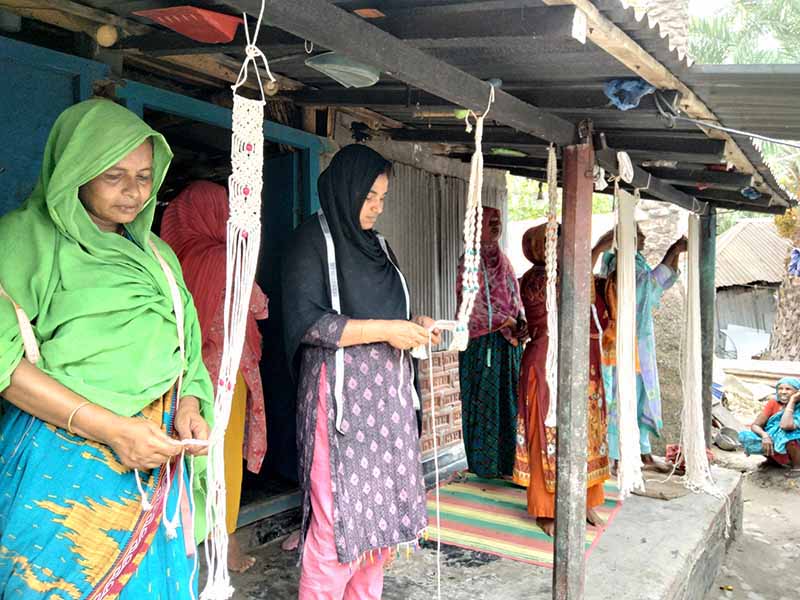
Empowering Marginalized Women | FAIR’s Transformative Initiatives
Introduction
The Empowering Marginalized Women project, initiated by FAIR, is dedicated to transforming the lives of marginalized women in Kushtia and beyond. Launched in 2017 with support from the Bangladesh NGO Foundation, this ongoing project focuses on economically empowering widows, divorcees, abandoned women, disabled women, and those affected by domestic violence. The goal is to help these women become financially independent and self-reliant.
As part of this initiative, 560 women have already received specialized vocational training in various handicrafts like jute products, Nakshi Kantha, and macramé items. The project also provided 90 additional women with specific training on jute product creation through the Youth Development Directorate of Bangladesh. Post-training, participants receive essential materials and ongoing mentorship, enabling them to apply their skills and produce marketable goods. The products made by these women are purchased directly by Karujog, which not only supports local sales but also provides opportunities for permanent employment by producing new items.
Through these efforts, women have experienced notable improvements in their personal and family economic stability, contributing to positive changes in their social and home lives. Ultimately, the project plays a key role in the economic and social development of marginalized communities in Bangladesh.
Project Rationale
In Bangladesh, especially in marginalized communities, women often face widespread social and economic discrimination. Widows, divorcees, abandoned, disabled, and impoverished women typically struggle due to dependency on male family members and a lack of vocational skills. This often leads to domestic abuse and a significant violation of their human rights.
The Empowering Marginalized Women Project was conceived to address these issues. By offering vocational training, providing necessary materials for production, and assisting with the marketing and selling of products, the project enables women to achieve economic independence. It empowers them to make decisions within their families and communities, shifting their status from dependency to autonomy and dignity. Through these efforts, FAIR ensures that women are not only economically empowered but also socially uplifted.
Project Title:Empowering Marginalized Women
Project Duration: 2017 to till now
Work Area: Kushtia Sadar
Beneficiaries: Widows, divorcees, abandoned, disabled, and impoverished women.
Partnership with: Bangladesh NGO Foundation
Project Goal
The goal of this project is to ensure sustainable economic empowerment for marginalized, underprivileged, and abused women by providing them with Crafts-based vocational training and creating employment opportunities.
Objectives of the Project
- Create Self-Employment Opportunities: Support women, especially widows, divorcees, abandoned women, disabled women, and impoverished women, by providing them with the necessary skills for self-employment.
- Enhance Skills in Handicrafts: Provide training in jute products, Nakshi Kantha, and macramé, enhancing their skills and financial independence.
- Increase Economic Security: Improve the income and economic security of marginalized women, ensuring their social and familial dignity.
Key Activities
- Baseline Survey: Data collection on the social, economic, and family status of abused women to create a baseline report.
- Beneficiary Selection: Identify and select the most disadvantaged and abused women based on survey data.
- Vocational Training: Provide 3 to 6 months of training in jute products, Nakshi Kantha, and macramé.
- Material Assistance: After training, provide essential materials to help women apply their newly acquired skills.
- Follow-up Support: Continuous mentoring and guidance to ensure women produce quality products and gain confidence.
- Product Marketing: Establish marketing channels in Kushtia and Dhaka; use social media (Facebook, Instagram) to reach broader audiences.
- Awareness Campaigns: Raise awareness through leaflets, brochures, and banners to promote the project and its products.
- Collaborate with Partners: Coordinate with Youth Development Directorate, local government bodies, and partners to ensure project sustainability.
- Regular Monitoring and Reporting: Track project progress, evaluate outcomes, and adapt the approach as needed.
Achievements & Impact
- Self-Employment Opportunities: Empowering women to engage in handicraft production, creating financial independence and boosting their self-esteem.
- Skill Enhancement: Trained women have gained expertise in handicrafts, improving their job prospects and enhancing their quality of life.
- Increased Family Income: Women’s involvement in product sales has significantly improved their family income.
- Social Inclusion: The project has led to increased social respect and active participation in their communities.
- Sustainable Empowerment: Women are moving towards economic independence, paving the way for long-term improvements in their living standards.
Challenges & Solutions
- Limited Resources for Training: Collaborations with local suppliers helped overcome shortages of training materials.
- Market Access Issues: The project leveraged digital marketing and established connections with national and international markets to overcome barriers.
- Social and Family Support: Addressed family resistance by involving family members in the process and raising awareness of the benefits.
- Support for Disabled Women: Special support, such as transportation and adaptive tools, was provided to disabled women.
- Financial Constraints: The project worked to diversify funding sources, ensuring sustainable support from local and international donors.
- Employment Opportunities: Strengthened market connections and provided post-training follow-up to ensure job sustainability.
Conclusion
The Empowering Marginalized Women project has proven to be a transformative initiative for the economically disadvantaged women in Kushtia, Bangladesh. By providing vocational training, offering material assistance, and facilitating market linkages, the project has paved the way for financial independence for many women. It has helped improve family income, foster social inclusion, and empower women to contribute meaningfully to their communities. The project’s continued success highlights its critical role in the economic and social development of marginalized populations.
Call to Action
Want to know how the Empowering Marginalized Women in Bangladesh project continues to change lives in Kushtia, Bangladesh? Visit FAIR’s official website today and support the empowerment of marginalized women in Bangladesh!
